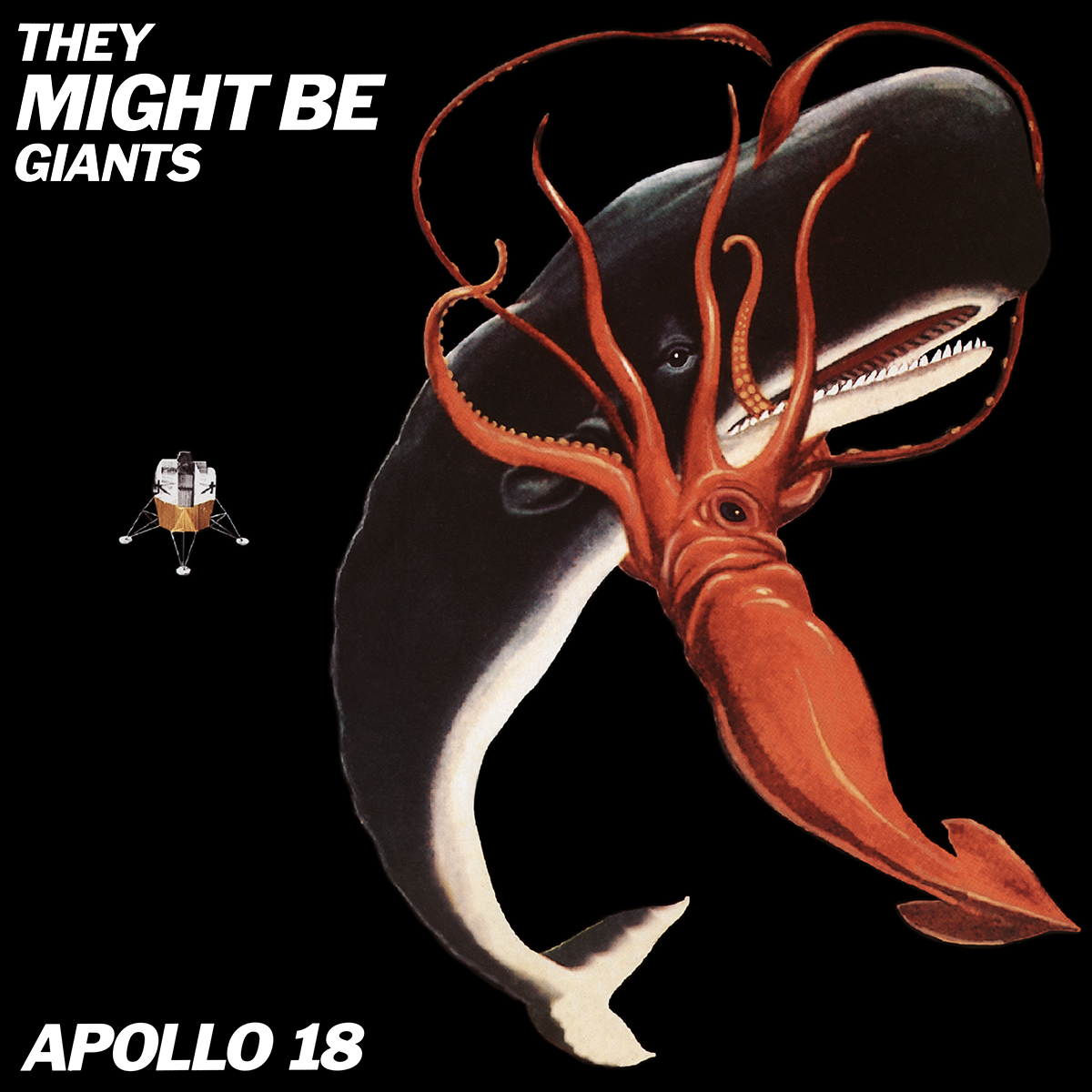
| release year | 1992 |
|---|---|
| type | album |
| listened to on | 2025-05-03 |
| new to me? | no |
| favorite (linnell) | I Palindrome I |
| favorite (flans) | Narrow Your Eyes |
| links | spotify, tmbw |
Apollo 18 defies categorization even to this day, as They Might Be Giants' final album without a full backing band. It is almost definitely TMBG at their most manic, taking the ethos that gave us Flood's 19-track runtime and bringing it to its logical conclusion. It is, solely in the length of songs, 2 Floods; it's more flooded, more songs, more everything, at whatever cost is necessary.
This brings us to the main themes of Apollo 18: cycles, relationships, and necessary antagonisms. Take the album cover as an example: squid are both predators and prey, existing in different parts of the food chain. This existence is natural and cyclical, thereby leading to a sustainable environment, but the relationship between these organisms seems antagonistic to us as people. It's as antagonistic as declaring our destiny to visit the stars; the stars are now our place to conquer, solely because we had a relationship of curiosity towards it. The space race and the arms race were one and the same.
We begin the theme of antagonism with Dig My Grave, a song about killing someone you hate without caring about the reprecussions; almost a precursor to When Will You Die? off of Join Us. The narrator here doesn't care whether or not they're going down with their enemy. They need them gone, and they, then, will become someone that needs to be gone from another perspective. She's Actual Size is very distinctly about seeing someone in a car mirror; someone who, well, may be a giant. This person is intimidating to the narrator; the person in the mirror feels like someone in power, someone scary. My Evil Twin, then, is about that direct antagonism; both sides of this relationship sees the other as actively evil and intimidating. (Perhaps they're the same person.)
More antagonism continues to manifest throughout the album, but it's important to first mention the theme of cycles. I Palindrome I immediately establishes this theme — manonamomanonamoman — via the palindromic nature of people's relationships to prior generations and history. This is also the point of The Statue Got Me High; a statue is a piece of art that very few people have intense emotional reactions to, but it is also a piece of work meant to symbolize the past. The narrator in that song, then, is experiencing connection to the past in a closed loop.
A lot of these cycles and antagonisms, despite our emotions telling us otherwise, are natural things; see Mammal, a story about the descendence of taxa throughout history. It's an ode to the nature of life itself as being one of continual replacement and refinement.
I can't reasonably hope to talk about every song here in my limited time; it's 9 PM, since I had a weird sleep day, and I still have three EPs to listen to. Let's talk about two things that I would be remiss for not mentioning, though:
The Fingertips songs, in their 21-song glory, culminates the themes of the album with audience antagonism. Fingertips is weird. It was weird at the time of its release, and it's weird now. My personal take is that Elektra didn't know what to do with Fingertips, and as a result began to coin the notion that Apollo 18 was meant to be played on shuffle despite the rest of the album's track ordering being very deliberate. I do think that the shuffle thing was on purpose, I just don't think that it's designed to be played on shuffle. If anything, Fingertips makes Apollo 18 more difficult to listen to on shuffle. Regardless, it's an introduction to the CD era, and a very innovative one at that.
Even in the modern day, Fingertips still defies the boundaries of record labels. In the streaming era, Fingertips is often condensed into one, large track; thereby fully killing the "shuffle" thing from before, and also making streaming services happier. Oftentimes, streaming will pay by total listens; Fingertips, then, could be seen as artifically attempting to pad the count of total listens via many short songs, despite its conception being decidedly pre-streaming.
Finally, I can't hope to talk about The Guitar without talking about James McIntyre. According to the 33 1/3 on Flood, James was a high-school friend of the Johns with an appetite for underground rock, he gave Flansburgh his first Ramones record and convinced him to learn the guitar. The three were close throughout high school, comprising the kind of underground avant-garde that often seems to occur in Lincolns. Being openly gay, Jimmy contracted HIV in the early 1980s, and the Johns were with him in his final days. This is why The Pink Album is dedicated to James' memory, and why my read of The Guitar is largely about the nature of death. Regardless: Who's that playing the guitar? Is it Jim? I'll leave you to decide that.